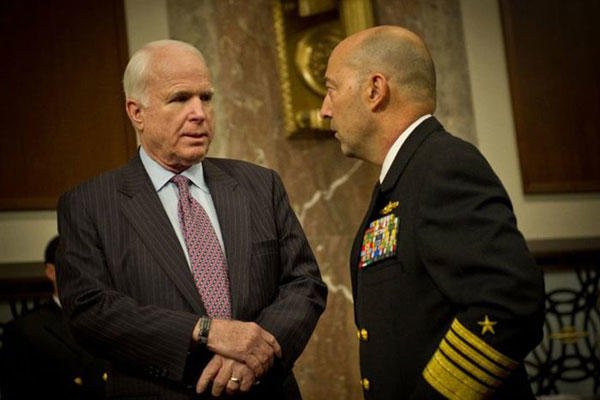Four Republican senators on Tuesday introduced legislation they say will improve veteran health care and restore accountability to a Department of Veterans Affairs rocked by allegations of mismanagement and manipulated patient schedules.
The Veterans Choice Act intends to eliminate lengthy wait times for veterans seeking care by letting them go to the private sector, with the VA picking up the tab. Although VA officials have that authority now, the VA mostly rejects outside care, Sen. John McCain, R-Arizona, said Tuesday.
"With ... this proposal if a veteran wants to go to a health care provider and he has this Medicare and Tricare [alternative] then that veteran can choose that," McCain said. "The veteran should have the choice of where he thinks he or she can get the best treatment. That's what this is all about."
The bill is the second filed in less than a week in the Senate aimed at making it easier for veterans to get the health care and for the VA secretary to more easily dismiss senior managers for not performing.
The other bill, the Restoring Veterans' Trust Act of 2014, was filed Monday by Sen. Bernie Sanders, I-Vermont, chairman of the Senate Veterans Affairs Committee. But the Sanders bill would also expand veterans' access to federal and community health centers and medical facilities that receive Defense Department and Indian Health Service funds. It also authorizes the VA to lease 27 new health facilities in 18 states.
This last provision, along with others, was drawn from an omnibus VA bill that Sanders failed to get passed in February. These provisions include extending the period of health care eligibility for combat veterans from five years to 10, giving in-state tuition status for all vets, restoration of a 1 percent cut in retirement cost-of-living adjustments, and expanded services to victims of military sexual assault.
"Altogether, the bill would provide education, retirement security and other benefits for millions of veterans and their families," Sanders said in a statement on the bill. "Virtually all of the provisions already have been approved by the Senate committee, many of them by unanimous votes during previous legislative markup sessions."
Sen. Richard Burr, ranking member of the Senate Veterans Affairs Committee and one of the co-sponsors of the bill filed Tuesday, acknowledged that the Veterans Choice Act is limited in scope.
"It's choice, it's transparency and it's change," he said. "It's not encompassing everything that Congress would like to pass as it relates to VA legislation but it addresses the urgent things needed right now."
Sens. Jeff Flake of Arizona and Tom Coburn of Oklahoma are also sponsors of the Choice Act.
The two Senate bills were spurred by allegations that the VA Medical Center in Phoenix, Arizona, maintained an unofficial secret list of veterans waiting for an appointment. According to some whistleblowers, up to 40 patients may have died before even getting an appointment.
Recent VA reports, including one by its Inspector General, confirmed the manipulation of appointments and found that similar practices were occurring across the country. Thus far, there has been no evidence that any patients died while waiting to see a doctor, the VA IG testified last month.
VA Secretary Eric Shinseki resigned on Friday after some of the allegations were confirmed through an audit and Sloane Gibson, named deputy secretary in February, was appointed to fill the top job until a permanent successor is named.
Only hours before he left, however, Shinseki endorsed the Sanders legislation. It was the first time he had publicly backed any increased authority to sack VA employees. He had testified he did not need increased authority to fire senior managers, and did not back the Department of Veterans Affairs Management Accountability Act filed by House Veterans Affairs Committee Chairman Rep. Jeff Miller, R-Fla.
Miller's bill passed overwhelmingly in the House last month. A sister bill filed in the Senate by Sen. Marco Rubio, R-Fla., has been stalled.
McCain said on Tuesday there are a number of Democrat senators interested in backing the Choice Act. If Senate Majority Leader Sen. Harry Reid fast-tracked the bill it would probably pass the chamber in a week, McCain said.
Under the Choice Act, all veterans enrolled for VA care would be given a card enabling them to get care from a non-VA provider if the VA can't schedule an appointment within the required time frame or if the veteran lives more than 40 miles from a VA hospital or outpatient clinic.
The bill also requires that the VA use Medicare prices and that any co-pay a veteran might have to pay goes to the VA, not to the outside provider.
McCain also said the law would end via a sunset clause at the end of two years, and that an audit be done every two years after that to ensure that VA has not fallen down on getting care to veterans.
Louis Celli, legislative director for The American Legion, said the organization worked closely with McCain's office on the bill.
"We wanted to ensure that the VA remains the main and primary source for health care for our veterans," he said. "In cases of emergency as we have now ... with veterans on this secret list that we need to eradicate, we support using all available resources to get veterans the help they need in as short a time as possible."
He also said the bill includes directive language ensuring that any notes and diagnoses made by private sector doctors and providers are forwarded to the VA, so there are never any lapses in patient history. And the providers will be responsible for getting them to the VA, not the veteran patient.
Celli said they have found instances in the past where veterans had to pay to have their medical notes sent to the VA. This would not happen under the Choice Act, he said.
-- Bryant Jordan can be reached at bryant.jordan@monster.com.





























